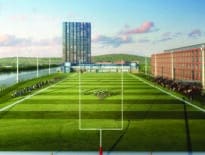
Behavioral health programs enjoyed a victory in a case before the Supreme Judicial Court that ruled a McLean Hospital program was protected under the Dover Amendment.
The Land Court in 2018 upheld a Lincoln Zoning Board of Appeals’ decision against McLean Hospital’s proposed residential program for adolescent males suffering from borderline personality disorder (BPD). The Supreme Judicial Court reversed that ruling last September.
McLean had sought to expand and relocate its 3East dialectical behavior therapy program for male BPD patients to a five-acre site in Lincoln. Individuals suffering from BPD lack emotional self-control, often resulting in low self-esteem, depression and drug abuse, and sometimes in suicide. McLean’s 3East program teaches patients strategies to improve interpersonal effectiveness, emotion regulation and distress tolerance. The program includes classroom training, homework assignments and mindfulness exercises. Patients meet with therapists twice weekly.
As a first step toward the relocation, McLean obtained confirmation from the Lincoln building commissioner that the 3East program was permitted as of right under the Dover Amendment of the Massachusetts Zoning Act. The Dover Amendment prohibits local zoning laws that restrict religious uses and nonprofit educational uses.
Case Law Supported Decision
Existing appellate court rulings supported the Lincoln building commissioner’s decision. For example, in Harbor Schools, Inc. v. Haverhill Board of Appeals, the Appeals Court ruled that the Dover Amendment allowed a residential school for emotionally disturbed children. The Supreme Judicial Court ruled in Gardner-Athol Area Mental Health Ass’n v. Gardner Board of Appeals and in Fitchburg Housing Authority v. Fitchburg Board of Appeals that residential facilities for mentally disabled adults and former mental patients have Dover Amendment protection, if they include significant educational components.
Nevertheless, several abutters appealed the building commissioner’s decision to the Lincoln board of appeals, which overruled the building commissioner. The board of appeals determined that the 3East program was mostly therapeutic, not educational, and therefore lacked Dover Amendment protection.
McLean appealed to the Land Court. The Land Court judge noted that education must be the “primary or dominant purpose” for the 3East program to enjoy Dover Amendment protection, then distinguished the 3East program from programs approved in earlier appellate cases. The judge acknowledged that the Dover Amendment protects educational programs that teach life skills, such as cooking, job-hunting and shopping. She considered those skills to be “focused outward.”
In contrast, the judge regarded the 3East program as mostly therapeutic instead of educational, because coping skills for emotional regulation and self-management “look inward.” Based on this distinction, the judge ruled that the 3East program was not entitled to Dover Amendment protection, and affirmed the Lincoln board’s decision.
What is the Program’s Primary Purpose?
The Supreme Judicial Court accepted direct appellate review of the Land Court’s ruling, and rendered its decision last month. The SJC foreshadowed its support for McLean’s case in the first two paragraphs of its decision. The first paragraph describes the 3East program as allowing “adolescents to develop the emotional and social skills necessary to return to their communities.” The second paragraph describes the Land Court judge’s distinction between “focused outward” programs and those that “look inward,” as “a novel theory.”

Christopher R. Vaccaro
The SJC identified the main legal issue as whether the primary purpose of the 3East program is educational. If so, the program enjoys Dover Amendment protection. If not, it doesn’t.
According to the SJC, in order for the 3East to earn such protection, its bona fide goal must be educationally significant, and this goal must be the program’s primary and dominant purpose. This analysis ensures that nonprofits cannot claim Dover Amendment protection by simply “engrafting an educational component onto a project.”
The SJC next considered whether the 3East program met those prerequisites. It noted that Dover Amendment protection is not limited to traditional schools and colleges, and that educational programs designed for “developing and training the powers and capabilities of human beings” are also protected.
The SJC found that the 3East program is educationally significant, because it teaches BPD patients coping mechanisms for everyday life challenges. It declined to adopt as dispositive a distinction between 3East’s educational and therapeutic program, and traditional academic programs. The SJC found that the 3East program qualified for Dover Amendment protection, and unanimously vacated the Land Court’s decision and ordered that judgment be entered in favor of McLean.
The SJC’s decision is a godsend for nonprofit behavioral health programs with significant educational and training components. Let’s hope that this decision fosters better behavioral health services throughout Massachusetts.
Christopher R. Vaccaro, Esq. is a partner at Dalton & Finegold, L.L.P. in Andover. He is also a director of Bridgewell, a human services nonprofit serving disabled individuals in northeastern Massachusetts. His email address is cvaccaro@dfllp.com.





